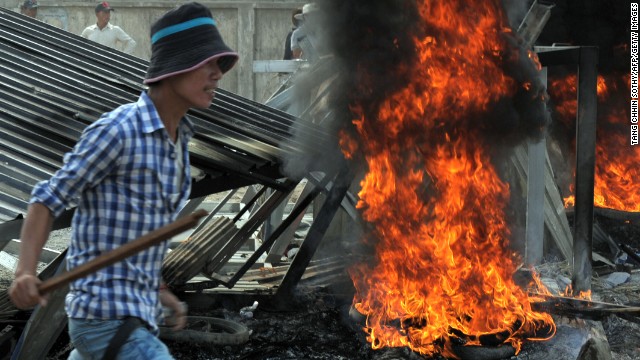 |
| A man armed with a wooden stick rallies during a protest in front of a garment factory in Phnom Penh on January 3. |
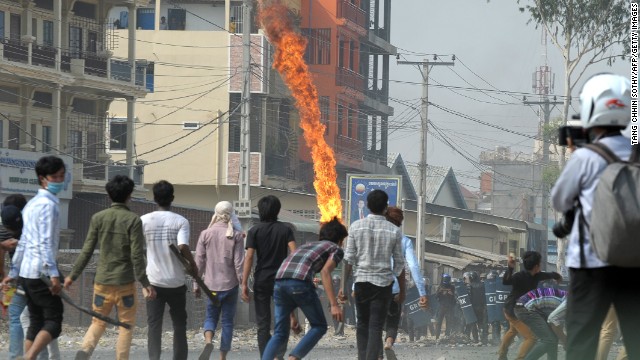 |
| Garment workers demanding higher wages clash with military police in front of a factory in Phnom Penh on January 3. The workers joined an opposition-run protest against Prime Minister Hun Sen after rejecting a salary increase proposed by the government. |
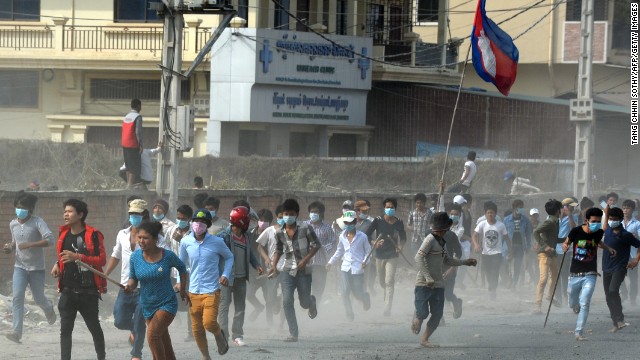 |
| Cambodian protesters run from clashes with military police in Phnom Penh on January 3, after a week-long demonstration for better pay turned violent. [Scroll down to see 14 more photos] |
Is Cambodia at a tipping point?
CNN | 10 Jan. 2014
Phnom Penh, Cambodia (CNN) -- Earlier this week,
Cambodia marked 35 years of freedom from the Khmer Rouge regime, whose
revolutionary blueprint for an agrarian paradise caused the deaths of
nearly two million in the 1970s.
But instead of uniting Cambodians, the date perennially divides them.
Prime Minister Hun Sen's
Cambodian People's Party casts the anniversary in the light of victory
and liberation. Opposition figures shrug off the festivities as
propaganda, a reminder that after the Khmer Rouge leaders retreated in
1979, the Vietnamese who defeated them stayed for 10 years.
The diverging
perspectives underscore what's happening now. In the name of public
order and security, the government commemorating the fall of a regime is
leading one of the most aggressive campaigns against dissenting foes in
recent memory, according to analysts.
"Cambodia is now at a
tipping point," said Carl Thayer, a longtime observer of the country's
politics and a professor emeritus at the University of New South Wales
in Australia.
Last weekend, the
Ministry of Interior temporarily banned demonstrations and the courts
have summoned opposition leaders Sam Rainsy, president of the Cambodia
National Rescue Party, and his deputy, Kem Sokha.
"Cambodian authorities
appear to have given up any semblance of democracy, rule of law or
justice," said Tola Moeun, head of the local advocacy group the
Community Legal Education Center, in a statement earlier this week,
after activists were briefly detained Monday in an apparent enforcement
of the ban on demonstrations.
"The big questions are what is next and who will be next? This madness must end now."
The United Nations'
human rights arm has urged an investigation into the violence, and major
clothing manufacturers that conduct business in Cambodia -- including
H&M, the Gap and Inditex, the parent company of Zara -- asked in a
letter for a peaceful resolution.
Seeds of conflict
Seeds of turmoil were
sown in July, when Hun Sen's long-ruling CPP lost a chunk of
parliamentary seats in the national elections, and Rainsy's Cambodia
National Rescue Party, or CNRP, almost doubled its own. But Rainsy and
his supporters claimed they were robbed of crucial votes that would have
put them in front, ending nearly 30 years of Hun Sen's rule.
They demanded an
international investigation into the election -- which didn't happen --
and for Hun Sen to step down. Thousands of people took to the streets in
protest.
While the opposition had
floundered at times -- revising its demands to include a new election
-- it appeared stronger than ever as 2013 came to a close.
The largely peaceful
journey of civil disobedience began to veer off course on December 24,
when unions, many of which line up politically with the opposition
party, called for a nationwide garment worker strike, demanding an
immediate monthly wage bump to $160 -- nearly double the $95 that the
government first offered, and well above the $100 that was eventually
proposed as a final offer.
Soon, new groups joined.
Tuk-tuk drivers demanded lower gasoline prices. Buddhist monks called
for the authorities to find a stolen golden urn believed to contain
ashes of the Buddha. All of the anger pointed in one direction.
Crackdown country
On the evening of January 2, the crackdown began.
In a protest outside a
garment factory, authorities arrested 10 people, including garment
workers and at least three human rights advocates, according to the
Cambodian rights group Licadho. The arrested men face up to five years
imprisonment.
The next day, anger
erupted outside the Canadia Industrial Park in southwest Phnom Penh.
Hundreds of garment workers threw rocks at security forces and created
burning roadblocks. Some carried Molotov cocktails. Military police
responded by firing automatic weapons. Five workers were killed in the
bloody clash, the U.N. said this week. Almost 40 were injured, and 13
people arrested, according to Licadho.
On the hectic day of the
confrontation, young men engaged in a standoff with a phalanx of riot
police. One protester, In Chanthan, 26, who works at the park, was
undeterred, cupping bullet casings in his hand as evidence. "Very
cruel," he said.
Authorities secured the
area. The sun rose on empty factories, smashed shops looted by
demonstrators, mourning families and fearful residents.
"I think Hun Sen
believes he's losing control of the situation," said Brad Adams,
executive director for Human Rights Watch's Asia division. The prime
minister has never really accepted the right to protest, he added.
The government defended
its actions, saying it had allowed the opposition to protest for months.
But members of the public complained, said Phay Siphan, spokesman for
the Council of Ministers, a collection of top cabinet posts.
"The third party wants
to use the street fairly. An ill person who wants medical attention gets
blocked," he said. "It's too much."
The forceful response on
January 2 had to occur because a national road was being occupied by
demonstrators, he said. At Canadia Industrial Park the following day,
protesters had become aggressive, damaging factories and throwing rocks
and using slingshots to project "iron balls" at authorities.
"It's not a protest anymore, it became a riot," he said, adding that the government feels sorry for those killed.
"We so regret that this happened, but they didn't obey peacefully, to cease all activity." he said.
Rallying point targeted
On the morning of
January 4, pro-government security guards and plainclothed thugs wearing
red armbands stampeded through the opposition's main protest camp,
Freedom Park, in the heart of the city, as tourists ate breakfast only
blocks away. Police at the scene did nothing to stop them.
"The military force kicked the protesters," said Soeng Piseth, 31, a microfinance worker who managed to escape.
City Hall issued a
statement justifying the clearing of the park, saying it was an attempt
to maintain order and security. The crowd "protested in an attempt to
topple the government, and burned down garment factories," said Mok
Chito, head of the department of central justice in Cambodia's Ministry
of Interior.
Siphan justified the
subsequent ban on demonstrations — which critics say is a crackdown on
free speech and freedom of assembly — saying "there has to be a
cool-down period. The divisions are so deep right now."
In tandem with the
eviction, summonses were dispatched to CNRP leaders Rainsy and Sokha,
asking them to appear in court on January 14 to explain the turmoil.
Sokha's political activities had landed him in jail before, and Rainsy's
brushes with the government caused him to flee to France in 2009,
returning last year on the coattails of a royal pardon.
By Sunday, January 5, security forces were stationed at various points in the capital.
A common refrain in
recent weeks has been that the rallies represented the most serious
threat to Hun Sen's government in years. But after heavy-handed pressure
in the first week of January, garment strikers have largely returned to
work and opposition leaders are regrouping. Freedom Park is eerily
empty.
On Thursday morning,
when an opposition-affiliated youth group tried to sing a song inside
the park, military police and security guards stopped them from getting
into the main area, sending a clear message that the government will
enforce its ban on demonstrations.
The opposition's staying power and resilience are finally being put to test.
"We have to wait until
the environment is a little bit calm," said Yim Sovann, a CNRP
spokesman, this week. He added that protests in the city would resume,
though he didn't say when.
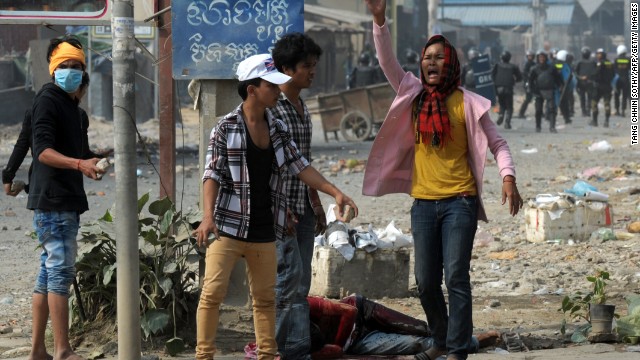 |
| A woman calls for help after a protester was wounded in violence in Phnom Penh on January 3. |
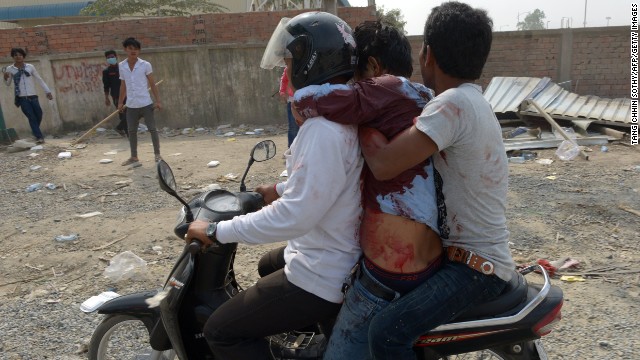 |
| Cambodian workers transport a man who was injured during a confrontation with military police on Friday. |
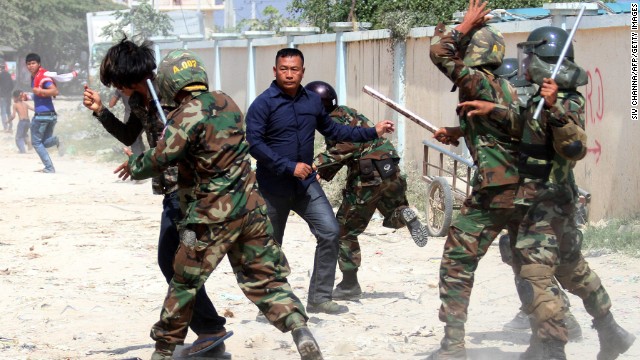 |
| Cambodian soldiers clash with protesters during a rally by garment workers calling for higher wages in front of a factory in Phnom Penh on January 2. |
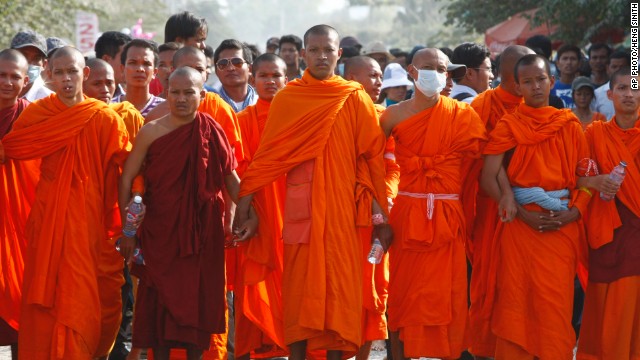 |
| Cambodian Buddhist monks stand together to form a barricade as they participate in a garment workers' strike outside a factory on the outskirts of Phnom Penh on Thursday. |
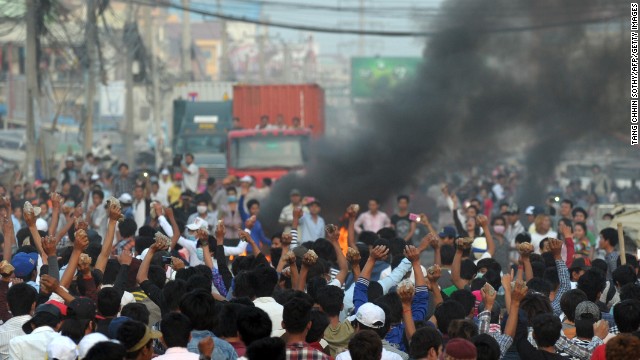 |
| Cambodian garment workers carry rocks as they shout slogans after a brief clash with police during a protest outside a factory in the country's capital on Thursday. |
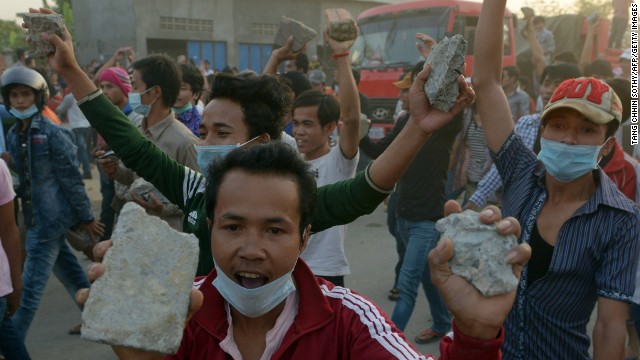
Cambodian garment workers carry rocks as they shout slogans after a brief clash with police during a protest to demand higher wages in front of a factory in Phnom Penh on January 2.
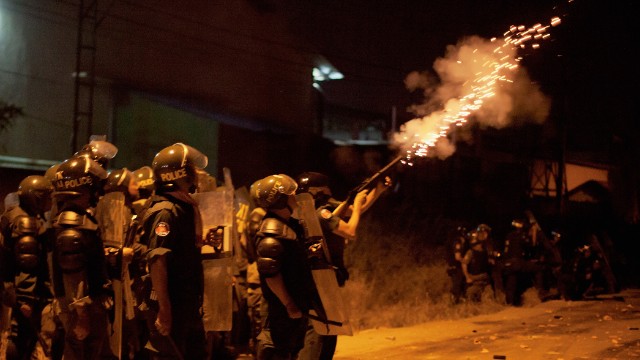 |
| A member of the Cambodian police fires tear gas during a crackdown on striking garment workers on January 2 in Phnom Penh. |
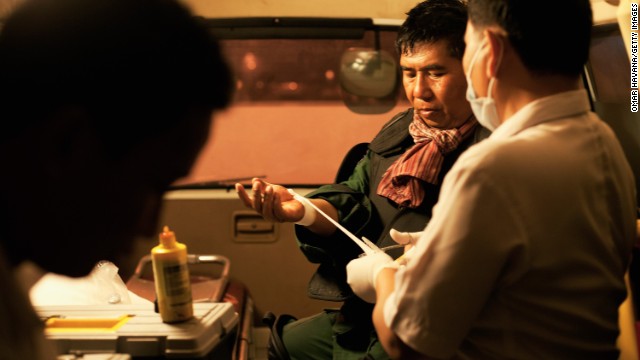 |
| Doctors bandage an injured policeman during clashes with garment workers on strike in Phnom Penh on Thursday. |
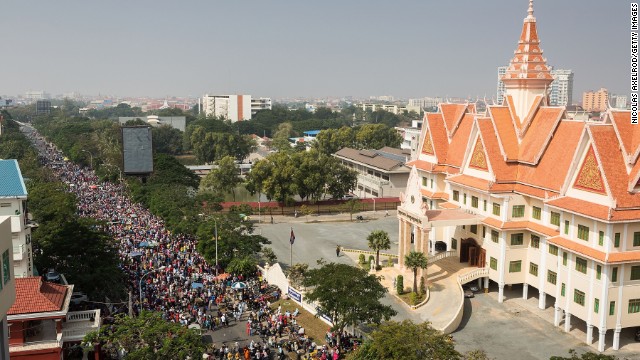 |
| Garment workers protest in front of the Ministry of Labor on December 30, 2013 in Phnom Penh. |
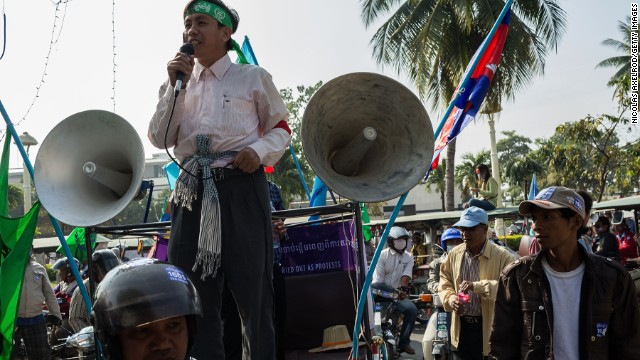 |
| A union leader talks to tuk-tuk drivers and informal workers in front of the Ministry of Finance on December 29, 2013 in Phnom Penh. |
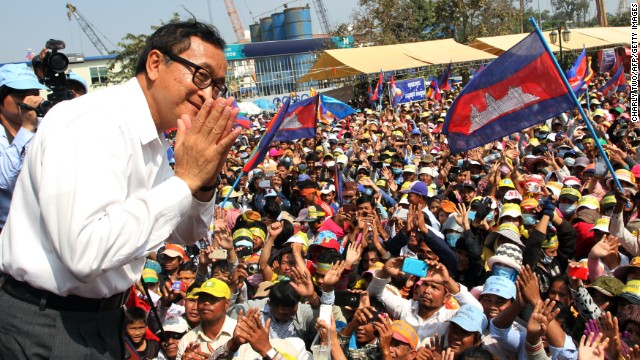 |
| Leader of the opposition Cambodia National Rescue Party (CNRP) Sam Rainsy greets supporters during a demonstration in Phnom Penh on December 29, 2013. |
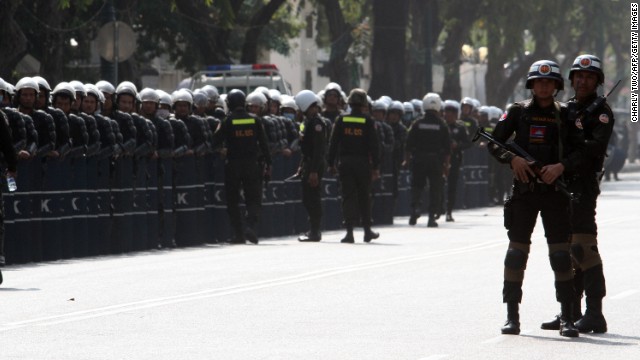 |
| Military police officers stand guard near Cambodia Prime Minister Hun Sen's residence in Phnom Penh on December 29, 2013. |
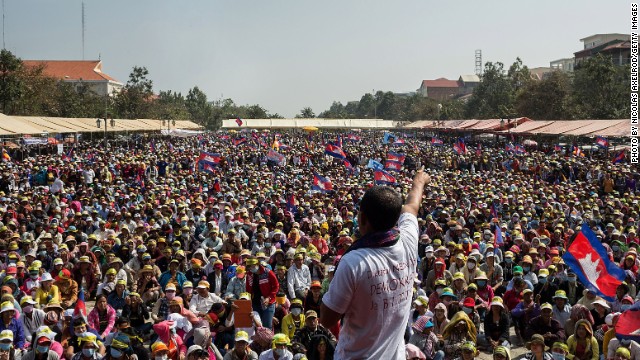 |
| A Cambodia National Rescue Party supporter address crowds at Freedom Park on December 29, 2013 in Phnom Penh, Cambodia. |


No comments:
Post a Comment